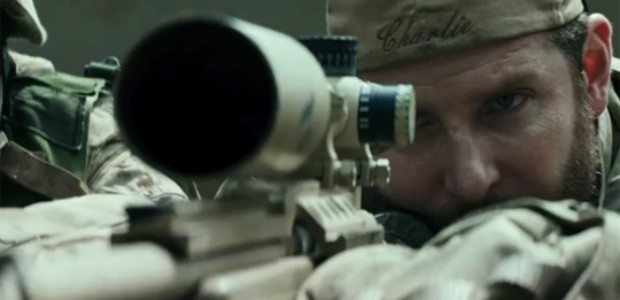American Sniper is Clint Eastwood’s second 2014 film (after Jersey Boys) and the best we have seen from this veteran film director in years. Contextually, this film looks and feels like 2008’s Academy Award winning Best Picture, The Hurt Locker, but with Eastwood’s deft storytelling, American Sniper is equally entertaining and thrilling, yet dramatic and tragic, and wrung with palm-sweating tension throughout.
Based on memoirs of the highly decorated US military sniper Chris Kyle, the film opens in Iraq in 2003, and sets the tone for the rest of the film. Kyle (Bradley Cooper) is in prone position on a rooftop, rifle in hand, and tasked with over watch as an infantry unit kick down doors in search of insurgents. He sees a woman and child approaching the unit but must make a split-second decision on whether they pose a threat to his fellow soldiers down below. His spotter reminds him that he could “fry” if he kills an innocent woman and child. His gut tells him otherwise. Just when his finger is wrapped around the trigger and ready to squeeze, we are taken back on a 25-minute flashback. We see him raised in a conservative Texan family, then through rigorous Navy SEAL training, and then courtship, marriage and parenthood. It’s a vital segment that makes us want to care about him and the decision he is about to make. It is also where we learn Kyle’s three main priorities – God, Country, Family – values that would go on to make him a “Legend”.
It takes four tours of Iraq and 160 confirmed kills to earn that proclamation but we don’t get to see as many kill shots. Between taut firefights in Iraq and coping with the anxiety of his wife (Sienna Miller) in Texas, we get hard-wired into Kyle’s psyche thanks to a career-best performance from a bulked-up Bradley Cooper. After Academy Award nominations in Silver Linings Playbook and last year’s American Hustle, Cooper is on a hat-trick and this is definitely a side of him we have never seen before. Miller, on the other hand, gets to portray the wife of a soldier and she delivers with seasoned skill, but these scenes are too few and short for a screenplay intended to venerate a war hero. And how it does! With about 90 percent of the screen time dedicated to Kyle, we are given a complex character study of an individual tasked with preserving or taking life. Unlike other war films where soldiers kill counterparts ‘in the line of duty’, Cooper’s Kyle often finds himself wrestling with an almost obsessive compulsive disorder but one that ensures his wife and kids remain free and safe in the motherland. However, the ramifications are close behind. As much as Kyle is revered by his peers and commanding officers, the price on his head swells, and so does his reputation amongst insurgents as “The Devil of Ramdi”.
In the wrong hands, American Sniper could have been misconstrued as American propaganda. Look no further than Peter Berg’s The Kingdom, a right-wing hoopla that literally screams “Us versus them”. Instead, 84-year-old Eastwood shows restrain for political subletting, especially given recent headlines on the on-going “war on terror”, by telling a well-knit story of courage, determination and patriotism. Not since his very own WWII double-feature, Letters From Iwo Jima, and Flags of Our Fathers (both in 2006), has Eastwood been so confident and controversial in an action film. Dusty, smoky, war torn Iraq feels authentic and that’s before some frantic gunfights reserved for the many action sequences. While action scenes can get quite heavy and violent, at times it feels like a portion of a first-person-shooter video game. Then again, American Sniper is all about Chris Kyle, his POV, and why the US military could benefit from more soldiers like him. Towards the end, one scene has Kyle pull off a near impossible shot with utmost precision. It’s one of several reasons why Kyle will always be known as “The deadliest sniper in US military history”.
Rating: 




